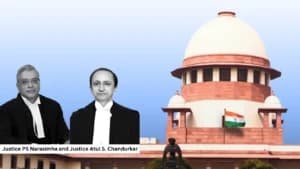The Supreme Court of India has strongly condemned the Punjab government for attempting to distance itself from an undertaking given by its Additional Advocate General in 2002. The commitment assured that the state would implement the Punjab Privately Managed Affiliated and Punjab Government Aided Colleges Pensionary Benefits Scheme, 1986. However, the Punjab government later claimed that the undertaking was given by the officer personally and did not bind the state.
A bench comprising Justice Abhay Oka and Justice Ujjal Bhuyan issued a show cause notice to Punjab Chief Secretary KAP Sinha, directing him to explain why contempt proceedings should not be initiated against him for failing to comply with the undertaking given to the High Court.
"In spite of repeated undertakings given to the High Court, compliance has not been made by the state government. Therefore, we issue a show cause notice to Shri KAP Sinha, Chief Secretary, State of Punjab, calling upon him to show cause why action under the Contempt of Courts Act, 1971 (both civil and criminal) should not be initiated against him." – Supreme Court
Read Also:- Supreme Court Orders Fresh Review of BCI Decision on Legal Misconduct Case
The bench also provided Sinha with the opportunity to identify other officials responsible for the breach so that appropriate action could be taken against them. The notice is returnable on March 24, 2025.
The court also served notice to the Deputy Director, Office of the Director for Public Instruction (Colleges), Punjab. He was asked to explain why action should not be taken against him for filing a misleading affidavit stating that pension benefits were not granted due to employees failing to exercise their options. The court found this claim to be untrue, as the scheme itself had never been officially published or implemented.
The Supreme Court expressed its strong disapproval of the state’s conduct and declared that it would no longer entertain oral submissions from Punjab’s legal representatives. Instead, all submissions must be supported by sworn affidavits from responsible officers.
The issue dates back to July 26, 2001, when the Punjab and Haryana High Court acknowledged an assurance from the state government that the pension scheme would be implemented within three months. However, no steps were taken to fulfill this commitment.
On May 2, 2002, the Additional Advocate General, following instructions from senior officials, gave an undertaking to the High Court that the scheme would be published and implemented by June 15, 2002. Relying on this assurance, the court refrained from initiating contempt proceedings.
Instead of implementing the scheme, the Punjab government introduced the Punjab Privately Managed Recognised Affiliated Aided Colleges (Pension and Contributory Provident Fund) Rules, 2002. Over the years, the state repeatedly sought adjournments, citing efforts to repeal these rules. Between 2011 and 2012, the government assured the High Court of its intent to comply, only to later present a bill in the legislature on December 18, 2012, repealing the 1996 scheme retrospectively from April 1, 1992.
Read Also:- Advocates-On-Record: The Backbone of Justice - Insights from Justice Surya Kant at Felicitation Event
On February 18, 2025, Punjab argued that the 2002 undertaking was made by the Executive and not by the State Government. The Supreme Court dismissed this argument, stating:
"The order explicitly mentions that the Additional Advocate General, on instructions, gave an undertaking to publish and implement the scheme by June 15, 2002. The state government cannot shift the blame onto the Executive. If such an approach is accepted, courts will struggle to rely on any statements made by state law officers." – Supreme Court
During the hearing, the Supreme Court directly questioned the Punjab Chief Secretary, who attended via video conference. Justice Oka pressed for a clear response on whether the government would grant pension benefits under the scheme.
"Either today you confirm that the petitioners will be granted relief, or we will proceed with contempt proceedings. Let officers go to jail, and then we will hear you." – Justice Abhay Oka
Initially hesitant, the Chief Secretary responded, "I will have to go by whatever my lord will say." However, Justice Oka clarified that the court was not compelling him but was merely seeking a straightforward answer.
When the Chief Secretary remained non-committal, Punjab Advocate General Gurminder Singh requested a week's time, arguing that an immediate decision would breach a subsequently passed law. The court rejected this request, forcing the Chief Secretary to confirm that the benefits would be granted.
Read Also:- Supreme Court Hints at CBI Probe into Builder-Bank Nexus Exploiting NCR Homebuyers
Expressing its dissatisfaction, the Supreme Court criticized Punjab for misleading the judiciary on multiple occasions. Justice Oka remarked:
"The court has been completely taken for a ride. The state first gave an undertaking, then introduced rules, promised to withdraw them, and later enacted a law to repeal the scheme."
The Advocate General urged the court to reconsider the matter from the perspective of fully implementing the scheme. However, Justice Oka insisted that the state had to be held accountable.
"Officers must understand that courts cannot be misled. If we fail to act now, it will set a dangerous precedent." – Justice Oka
The Supreme Court ruled that Punjab must submit sworn affidavits from responsible officers instead of relying on oral submissions from its advocates. A final hearing on the matter has been scheduled for March 24, 2025.
Case Details:
- Case No.: Petition for Special Leave to Appeal (C) No. 19667/2015
- Case Title: Rajnish Kumar & Ors. v. State of Punjab & Ors.
- Next Hearing Date: March 24, 2025















